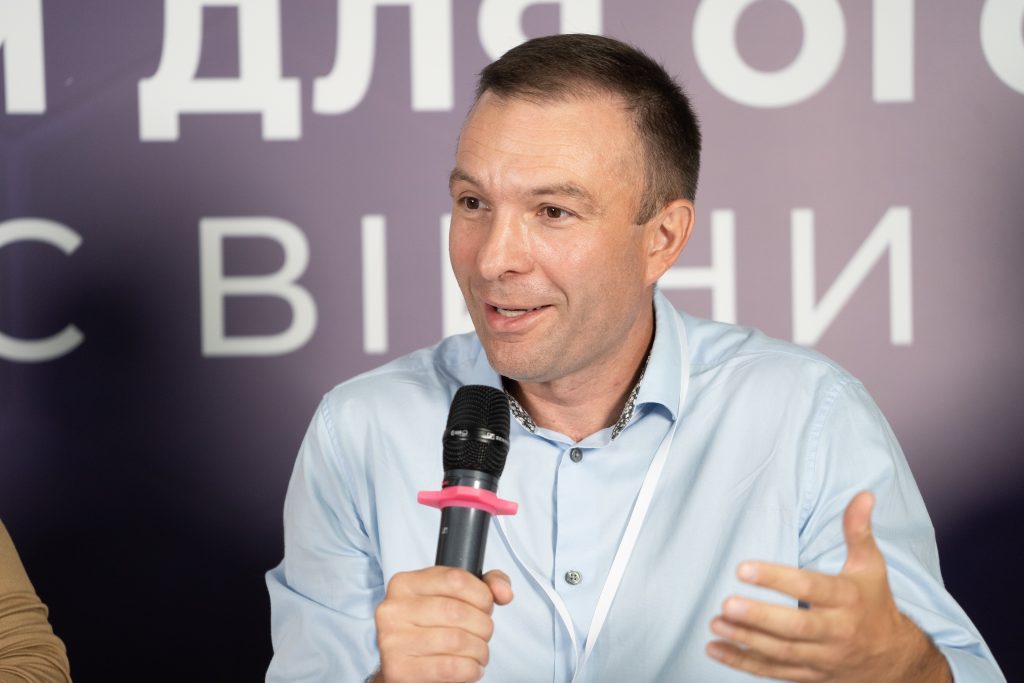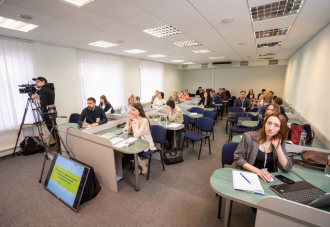On September 14-15, 2023, in Kyiv, as part of the Project Ukraine Civil Society Sectoral Support Activity implemented by the Initiative Center to Support Social Action “Ednannia” in consortium with the Ukrainian Center for Independent Political Research (UCIPR) and the Centre for Democracy and Rule of Law (CEDEM), CEDEM held the III Forum of Legal Reforms for Civil Society under the motto “Getting Stronger in Times of War“. The International Foundation for Electoral Systems became a partner of the Forum.
The Forum served as a platform for an all-Ukrainian discussion on progress in improving the legal framework for civil society organizations in wartime. To keep all participants safe, the Forum was held in an underground room protected from air raid threats.
For a video recording of the Forum, see the link (first day, second day)
“It is very symbolic that the Forum falls on Democracy Day and Civil Society Week in Ukraine. This year, the Forum gathered more than 300 participants: representatives of civil society, international organizations, public authorities, local self-government. There are also representatives of business and international organizations,” said Olesia Kholopik, CEDEM Director.

She announced that the main goal of the Forum will be to create a platform to discuss the progress of implementing the Legal Reforms Roadmap, challenges of democracy in times of war, obstacles for volunteers and humanitarian aid providers. And, of course, the search for answers and solutions to these challenges.
“Ukrainian civil society is not only organized groups. It is also citizens who have stood up to provide services to their communities in the defense of Ukraine. The whole world admires the struggle not only for independence, but also for freedom and democracy, the kinds of things that civil society organizations work on every day,” said Marc Ellingstad, Director of USAID’s Democracy and Governance Office of the Mission to Ukraine.
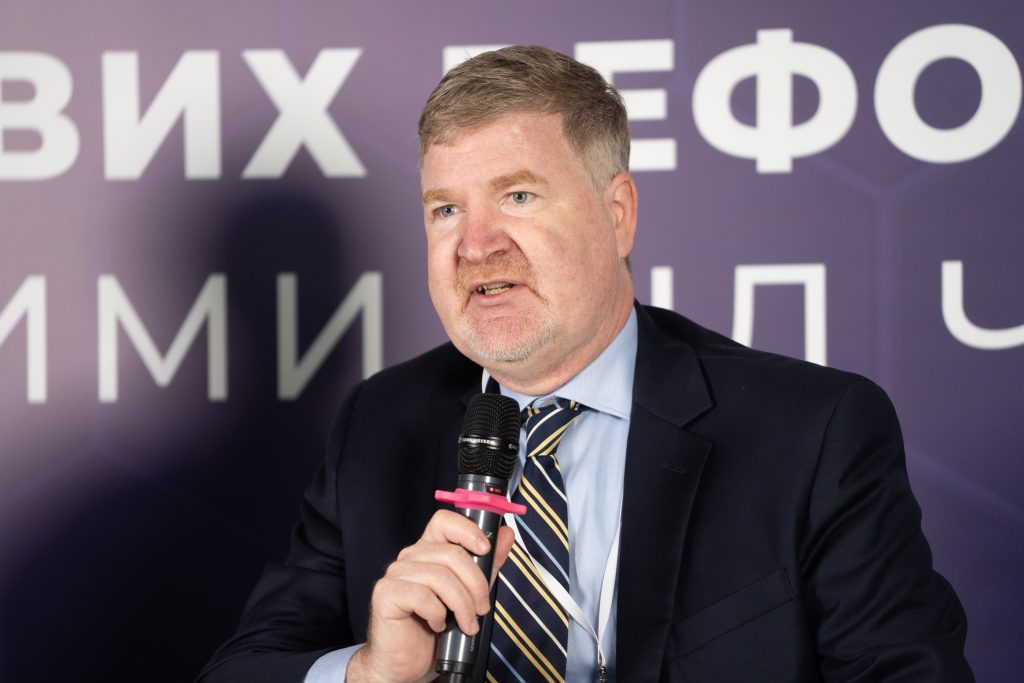
“Participation, inclusion of millions – this is how Oleksandr Korniienko, First Deputy Chairman of the Verkhovna Rada of Ukraine, described the volunteer drive of Ukrainians.
“We always dreamed that at least 5% of people, rather than just 2%, would report being involved in civic activities in surveys. Now it is twenty percent. I think this is a good opportunity that we should not lose. To achieve this, everyone should focus on their own responsibilities: civil society organizations should become stronger, and the authorities should create the framework that the sector orders,” he pointed out.
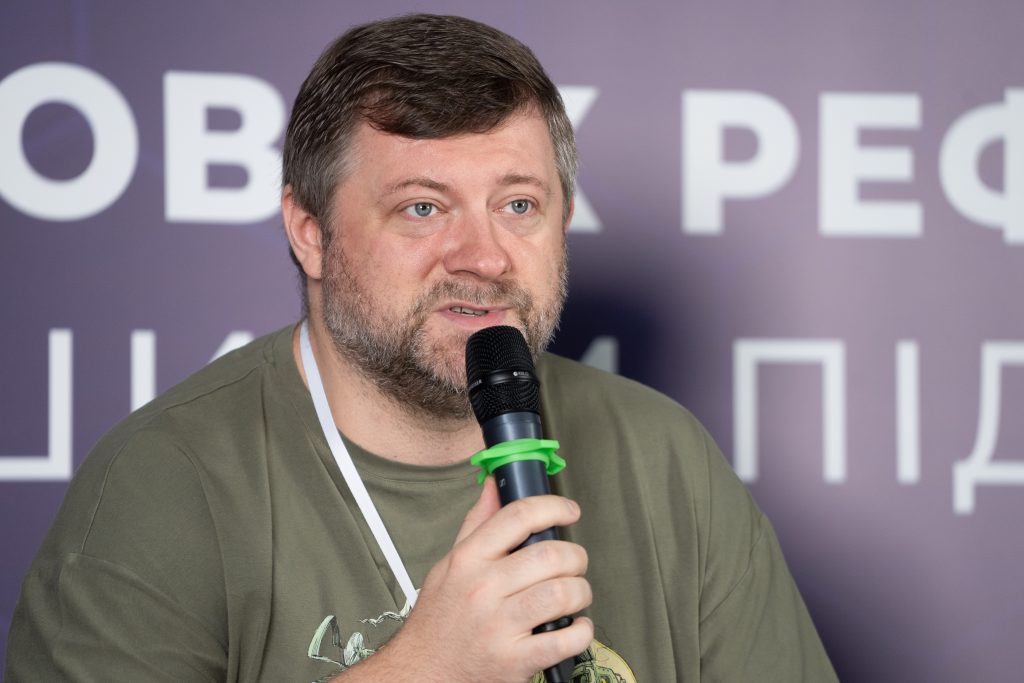
Volodymyr Sheihus, Executive Director of the Initiative Center to Support Social Action “Ednannia”, noted that more than 100 thousand CSOs were active in Ukraine before the big war. And 80% of CSOs continue to fulfill their mission.
“When people unite around certain problems and challenges, they create civil society. It begins with civic activity, when they take up the solution of certain problems. Today, civil society is united with other sectors: government, business, international partners, media. Together we are powerful,” he emphasized.
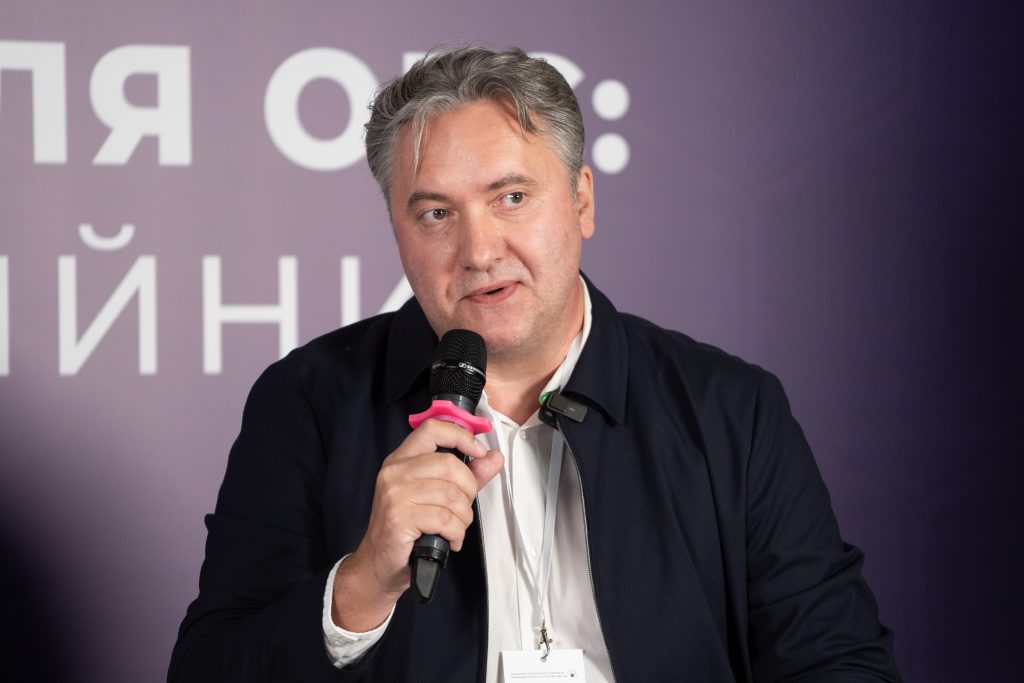
The Forum participants were also congratulated by Erlend Falk, Deputy Head of the Council of Europe Office in Ukraine. He pointed out that democracy and human rights acquire new meaning in times of war and spoke about the best practices that can ensure constructive cooperation between the civic sector and the state. Among them, the speaker mentioned partisanship, trust, accountability, transparency and independence.
How CSOs, government and business got together to change the country for the better
Traditionally, the Ukraine Civil Society Sectoral Support Activity organizes a story contest “Civil Society, Business and Government – Best Practices of Cooperation”. Its goal is to collect and popularize examples of successful joint projects to inspire others.
According to Anna Isichko, Deputy Director, Project Coordinator of the CEDEM’s Ukraine Civil Society Sectoral Support Activity, as of September 14, the organizers received 82 applications from 20 regions.
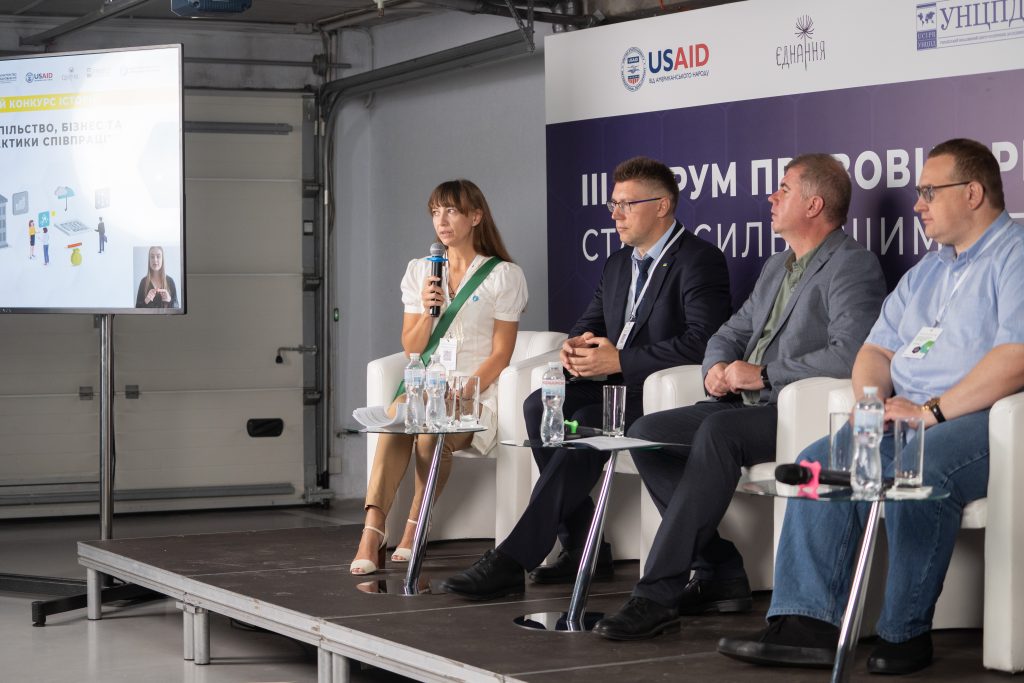
Most of them (48 stories) were sent by state authorities, 28 more were submitted by CSOs, and six stories were shared by businesses. They focused on humanitarian sphere, culture, environment, support for IDPs and persons with disabilities, community development, and business assistance, among others. The organizers will tell more about the detailed results of the contest and the stories themselves after its completion. By the way, applications were sent in even during the Forum.
Taras Shevchenko, Deputy Minister of Culture and Information Policy of Ukraine for European Integration, noted the significance of this contest.
“Communication of specific stories is something that should inspire NGOs, business and authorities to cooperate. There are certainly many such examples as it is. However, the constant attention, awards for the winners is something that has proven successful in practice. It has always been gratifying when the winners wrote about the stories, posted photos, and took pride in them. That competitive spirit definitely adds to the energy to create new stories. After all, it is in synergy that victory is created”.
This format allows seeing successful practices of intersectoral cooperation – emphasized Oleksandr Yarema, State Secretary of the Cabinet of Ministers of Ukraine.
“We have seen on the example of previous competitions how this cooperation gives much more than just the sum of the components. It is the times of great challenges that show how important it is when NGOs join in where the state has failed. Where they lack strength, the state helps them. After all, we have a common task: win the war and transform the country after the victory”.
In addition, the contest helps consolidate the authorities and society, because they have common needs: To have a convenient and clear framework for cooperation – as stated by Vasyl Lutsyk, Chairman of the National Social Service of Ukraine
“I hope that this forum will give a new impetus and new ideas so that in the future these best practices from the contest can be adapted as changes in legislation, practices for other volunteer organizations.”
Three years of Legal Reform Roadmap: changes and challenges
For three years now, Ukraine has had the Legal Reforms Roadmap – an analytical, visionary and policy document, with the vision of the civic sector on priorities for reform and improvement of the legal environment for civil society organizations in Ukraine for 2021-2025. During this time, some provisions have been implemented, and many have changed, as half of the Map’s “lifespan” falls on the full-scale war.
“This is the key vision of civil society organizations: Where there are problems in the legal environment, what prevents the public from developing, what is missing, and what needs to be done. There are answers to the questions here. 91 pages, 370 solutions we came up with, 250 organizations involved in the creation of this document,” said Maksym Latsyba, Head of the UCIPR Civil Society Development Program. He spoke about the key achievements on certain sections of the Map.
- CSO legal status and registration.Draft Law No. 8084, which will allow registering an organization online or at the Administrative Services Centers (ASC), was passed in the first reading. Law No. 6320 is already in force, which requires that information on ultimate beneficial owners (UBOs) be submitted only when they are changed rather than annually – and this can also be done online. CSOs will automatically receive non-profit status, and to simplify their work, Model Articles of Association and Draft Methodology for Determining UBOs have been developed for them.
- Taxation of CSOs and charitable activities. A new version of CMU Resolution No. 174 with an automated system, declarative principle and digitalization for humanitarian aid providers has been adopted. Draft law No. 9111, which simplifies its importation, accounting and distribution, is awaiting its second reading. In addition, the Rada has draft laws No. 7500 and No. 7501 on the possibility for citizens to deduct part of their taxes to support CSOs.
- State and financial support of CSOs. A new version of CMU Resolution No. 1049 on project competition was adopted: with an online format, unified procedure and monitoring. There is even an option for citizens to vote for the projects. The “Space of Electronic Contests” portal makes participation in them even more accessible. And youth NGOs are entitled to institutional grants – this is the norm of the new law “On the Basic Principles of Youth Policy”.
- Involvement of CSOs in the social services and social entrepreneurship. A number of changes have been adopted, in particular the regulation on the register of social service providers and evaluation. However, according to Maksym Latsyba, the government and local self-government do not announce the procurement of social services. They do not invest money in procurement, so civil society institutions do not participate in this process.
- Development of volunteer activity. This is one of the most successful spheres. Changes have already been adopted that add new areas of volunteering, personal income tax on logistical expenses of volunteers and event participants has been abolished, registration and account opening for military volunteers has been simplified separately. Draft Law 10040 on amendments to the Tax Code of Ukraine regarding exemption from taxation of life insurance for volunteers has been registered.
- Public participation in the development and implementation of decisions of the authorities. There are a number of draft laws important for the sphere (in particular, No. 4254 – on public consultations, No. 7283 – on local democracy, in particular public hearings and local initiatives), but they have been adopted so far only in the first reading.
Separately, the speaker pointed to the issue of safety of volunteers. According to him, now a dialog with the new Prosecutor General and work with investigators has begun. However, it is necessary to build a systematic platform for a dialog among human rights activists, the General Prosecutor’s Office and the Ministry of Internal Affairs to find an answer to the challenges of failure of the law enforcement system in cases of threats to activists.
In addition, MP Roman Hryshchuk announced draft law No. 10026 on the development of volunteering for high school students, which will allow recognizing such volunteer experience.
“Then it may affect their first job or admission to higher educational institutions. However, it may remain just a law unless NGOs and charitable organizations get involved and offer some kind of work. After Covid and the war, it is super important for us to give children socialization, to get them out of the online world and into society. And communication with the third sector and joint work will bring them into the adult world”.
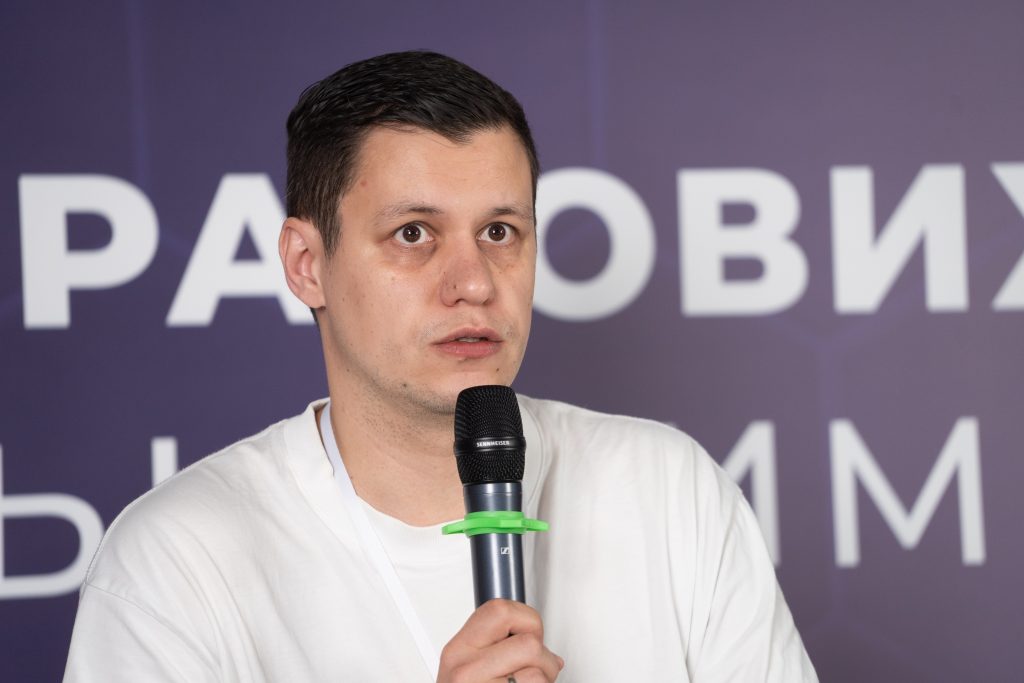
Olha Vasylevska-Smahliuk, MP of Ukraine, noted the importance of reducing the tax burden on organizations that engage volunteers, in particular the exemption from taxation of life insurance of volunteers, as well as the application of other mechanisms that will contribute to the smooth operation of CSOs and will not have a burden on the budget of the country. She also emphasized the importance of applying a risk-oriented approach to CSOs in the implementation of primary financial monitoring procedures – so that there would be no unjustified freezing of accounts of such CSOs and respective funds.
Nataliia Oksha, Deputy Director of the Department of Information and Public Relations, Head of the Civil Society Development and Public Communications Division of the Cabinet of Ministers Secretariat, also shared her thoughts on legal reforms, describing the progress in the implementation of the Action Plan to implement the National Strategy for Facilitating Civil Society Development. Ms. Nataliia noted that the Legal Reforms Roadmap served as one of the bases for the preparation of this strategy.
Taras Tarasiuk, Ilko Kucheriv Democratic Initiatives Foundation, and Nataliia Popova, founder of the NGO Ukrainian Association for Health Protection “Marlog-Caducei” took part in the discussion, presenting a study of the main challenges for the volunteer environment during the war.
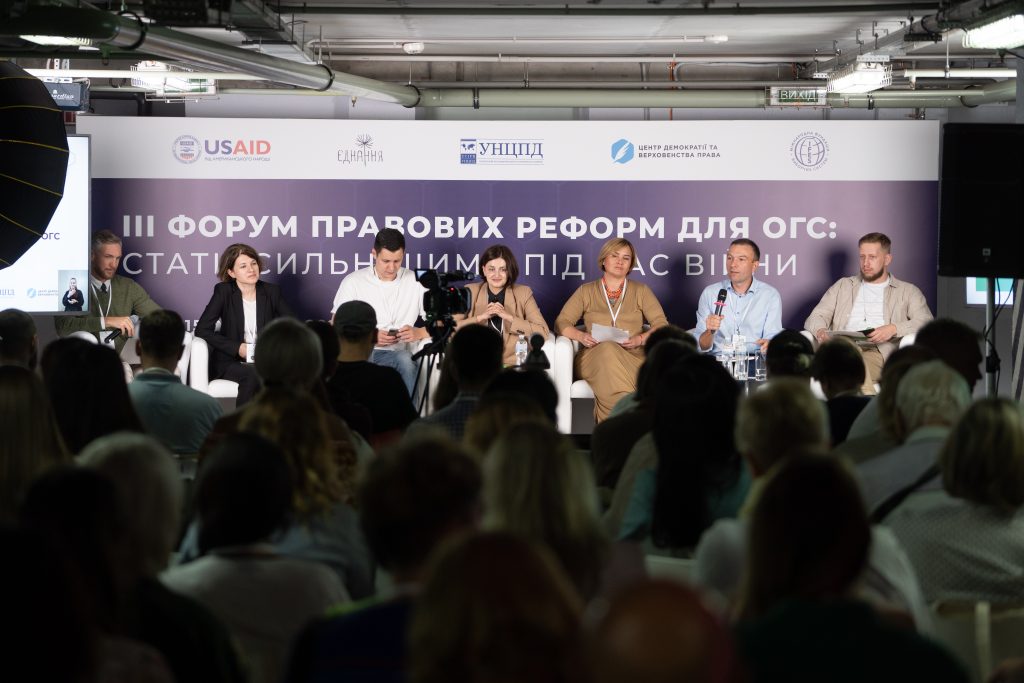
Why it is necessary to insure volunteers and how to protect them
A new topic was life and health insurance for volunteers. It is especially relevant in times of war, when aid providers risk their lives, so changes are needed in this area.
“Actually, the practice of insurance of volunteers by organizations is practically absent in Ukraine, while in the world volunteers are insured even by organizations that involve them in areas that are not risky for life and health. It is necessary to integrate this into the work of organizations as much as possible so that volunteers get protection,” said Nataliia Povtar, lawyer in the field of development and support of civil society organizations.
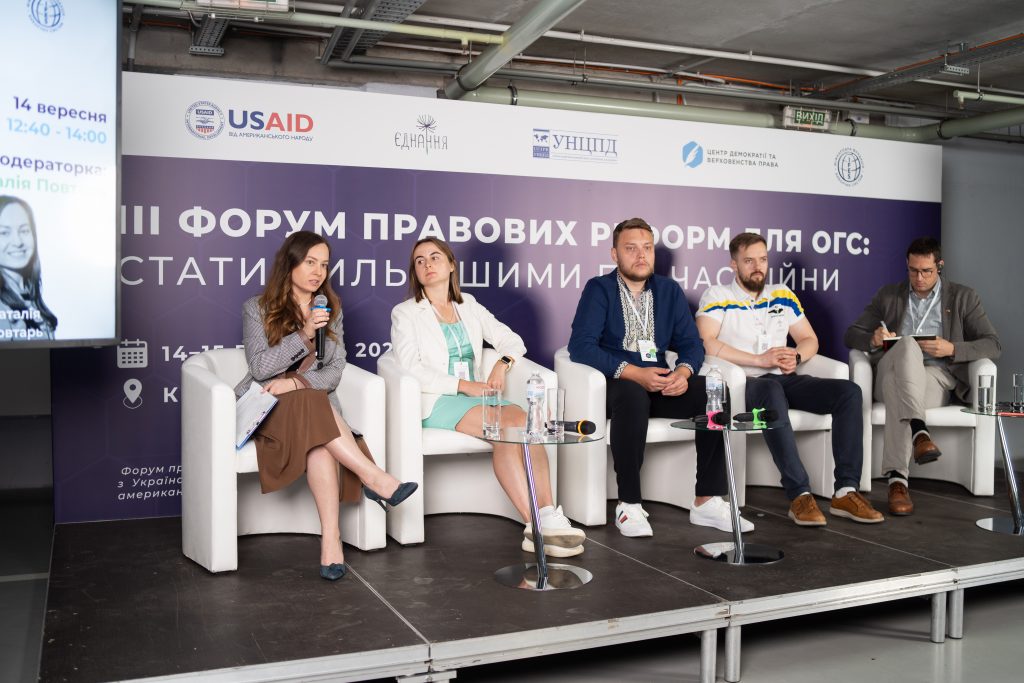
The discussion was attended by Olena Shuliak, MP of Ukraine, Chair of the political party “Servant of the People”, Chair of the Committee on Organization of State Power, Local Self-Government, Regional Development and Urban Planning, Yevhen Koliada, Chair of the Humanitarian Coordination Center, Mario Trutmann, Humanitarian Policy and Protection Coordinator, Swiss Agency for Development and Cooperation and Viacheslav Bykov, Chair of Tabletochki Charitable Foundation.
By the way, on September 13, the Verkhovna Rada registered draft law No. 10040, which will exempt from personal income tax and military levy the expenses of CSOs for insurance of life and health of volunteers for the period of their volunteer activities. This will make it possible to cover more people with insurance coverage.
The next part of the forum was dedicated to security topics. During the panel discussion “Why is the safety of volunteers still not a priority?”, participants discussed the phenomenon of civic sector safety culture, current state guarantees of safety for volunteers, access to information and knowledge on safety for volunteers and social activists, discussion needs for oriented services and safety hotlines for the civil society representatives. Natalia Kalantaienko, Head of Partnerships Department of the Ukrainian Volunteer Service, Liudmyla Yankina, human rights activist, Project Manager at Human Rights Center ZMINA, Oleksii Dronov, curator of military training at Serhii Prytula Charitable Foundation, and Roman Buhaiov, security manager at Vostok SOS, expressed their opinions. The moderator was Oleksandra Melnyk, CEDEM Project Manager.
And during the smart talk “Trust and Verify! Why CSOs Should Vet Their Partners and How to Do It”, forum participants not only found out why and how to verify their partners, counterparties, donors and beneficiaries (this will help to protect themselves from unpredictable problems), but also learned about the tools that will help to carry out the verification and saw how they work in practice. The discussion with the participation of Martyna Bohuslavets, Executive Director of the NGO “Institute for Legislative Ideas”, Veronika Boiko, expert of the Open Data Association, Social Division Manager at YouControl, and Artem Starosiek, Molfar CEO, was moderated by Mariia Poloz, CEDEM Lawyer.
In partnership with the International Foundation for Electoral Systems, a panel discussion was held on “How to Ensure Democratic Elections After the War: CSO’s View on Challenges and Solutions”, with the below speakers: Yuliia Kyrychenko, Board Member of the Centre of Policy and Legal Reform (CPLR), constitutional law expert, Pavlo Romaniuk, legal advisor of the OPORA Civic Network, Vita Dumanska, leader of the CHESNO Movement, Olha Martynovska, expert on electoral issues of the Civil Holding GROUP OF INFLUENCE, Olha Khitsevych, Advocacy Manager of the FIGHT FOR RIGHT NGO. The discussion was moderated by Oleksandr Kliuzhev, an expert on electoral law reform of the International Foundation for Electoral Systems (IFES) in Ukraine. The key focus of the discussion was the impossibility of holding elections in Ukraine during martial law. The panelists spoke about various risk factors and presented a joint statement of NGOs on the incompatibility of elections and full-scale war, initiated by the OPORA Civic Network (the document is open for viewing only). The text of the statement is accompanied by a form for collecting signatures from all NGOs: https://forms.gle/qG9xa4Zuw7DY9s8k9.
In addition, two Mentorship Community events took place during the Forum. During the public discussion “Presentation of Ideas and Successes of Several Mentoring Programs That Are Being Implemented in the Civic Space”, the discussion focused on the mentoring mechanism, in which experienced NGOs share their experience and knowledge with the young ones. Many projects have already been implemented in this format. The discussion participants: Olha Shkarupa, Community Development Specialist, NGO CrimeaSOS, Pavlo Pushchenko, Executive Director of the Union “Civic Initiatives of Ukraine”, Olena Matviichuk, Coordinator of the Mentorship Program for Strengthening Advocacy and Other Capacities of CSOs, CEDEM, Vladyslava Kryzhna, joker and co-founder of the Ukrainian School of Theater of the Oppressed, NGO “Theater of Change”, Olha Voitovych, Program Manager of the Eastern Europe Foundation.
The second panel discussion also touched on mentorship: “Commonalities and Obstacles in Providing Quality Mentoring Services in the Civic Sector”. Olha Shkarupa, Pavlo Pushchenko, Olena Matviichuk and Vladyslava Kryzhna took part in it.
Day two: key topic – recovery
In addition to discussions about the present of civil society, the organizers of the forum set another goal: talk now about the restoration and modernization of the country after the victory. After all, it is logical to assume that CSOs and active citizens will continue to be drivers of change in peacetime – and the legal framework and formats for this should be laid down now.
Therefore, on September 15, a panel discussion was held “Citizen Participation in Ukraine’s Reconstruction and Development of Governmental Decisions: Legal Regulation and Forms of Involvement”. It focused on legislative initiatives that strengthen citizen participation in decision-making and transparency of the authorities, such as the already mentioned draft law No. 4254 “On Public Consultations”.
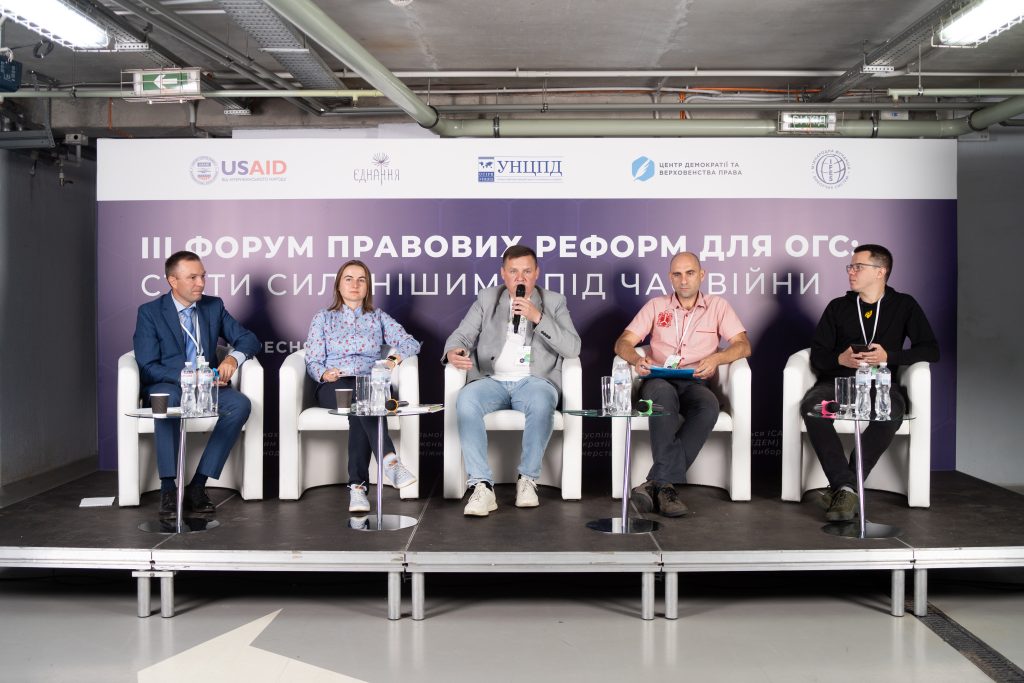
The participants of the discussion were Olena Shuliak, Head of the Verkhovna Rada Committee on Organization of State Power, Local Self-Government, Regional Development and Urban Planning, Serhii Sharshov, Head of the Department for Development of Local Self-Government, Territorial Organization of Power and Administrative-Territorial Structure, Maksym Lukiniuk, Consultant on Development of Public Participation Mechanisms at the Ukrainian Center for Independent Political Research, Oleksii Kolesnikov, Head of the Association for the Promotion of Self-Organization of the Population, Pavlo Ostrovskyi, Councilor of the Druzhkivka City Council of the 8th Convocation and Yurii Fomichev, Head of the Slavutych City Council, Maksym Latsyba acted as a moderator.
During the panel discussion “Victory, Recovery and Modernization of Ukraine: What is the Role of the Sector?”, the discussion focused on a more distant perspective: A vision of Ukraine-2030 through the lens of civil society development. In particular, the issues of peacebuilding, inclusive recovery and reintegration of de-occupied territories. The speakers of the discussion were Mariia Heletii, Deputy Head of the Project Ukraine Civil Society Sectoral Support Activity, Initiative Center to Support Social Action “Ednannia”, Olha Lymar, RPR Executive Director, Viktor Liakh, President of the Eastern Europe Foundation, Oleksandra Betlii, RISE Board Member, Project Coordinator at the Institute for Economic Research and Policy Consulting and Vladyslav Miroshnychenko, Analyst, UHHRU. The discussion was moderated by Ihor Rozkladai, CEDEM Deputy Director.
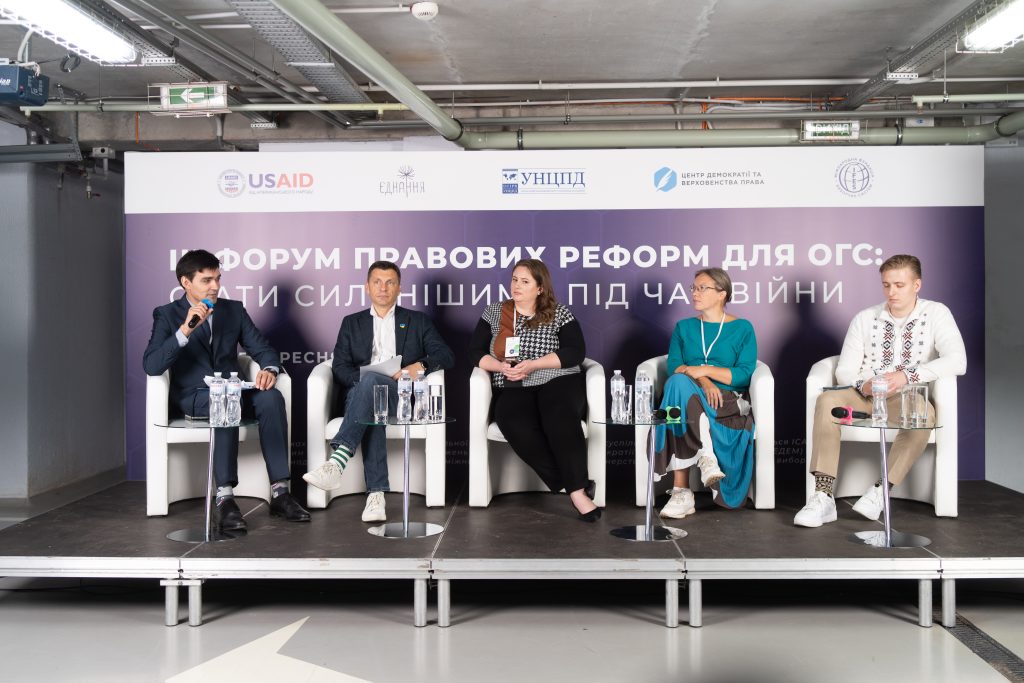
The last panel of the forum was dedicated to the Ukrainian Youth Foundation – because youth policy also determines the future. Its participants discussed the legal framework of the UYF, the expectations of civil society, the state and other parties, and, of course, the key steps to launch the first grant programs.
Oleksandr Sanchenko, MP of Ukraine, author of the Law of Ukraine “On the Basic Principles of Youth Policy”, Iryna Borzova, MP of Ukraine, member of the VRU Committee on Youth and Sports, member of the Supervisory Board of the UYF, Vladyslav Yatsuk, Deputy Minister of Youth and Sports of Ukraine, Dmytro Tverdokhlib, UYF Director, Ivan Mukomel, Regional Director of the Central-Eastern Portfolio of the project “Democratic Governance in Eastern Ukraine”, Oksana Kosenko, Project Coordinator of the Civil Society Development Project, UNDP, Volodymyr Sheihus and Oleksandra Radchenko, Coordinator of the E-Democracy component of the Eastern Europe Foundation shared their thoughts. Yuliia Fediv, National Coordinator for Culture at the UNESCO Office in Ukraine was the moderator..
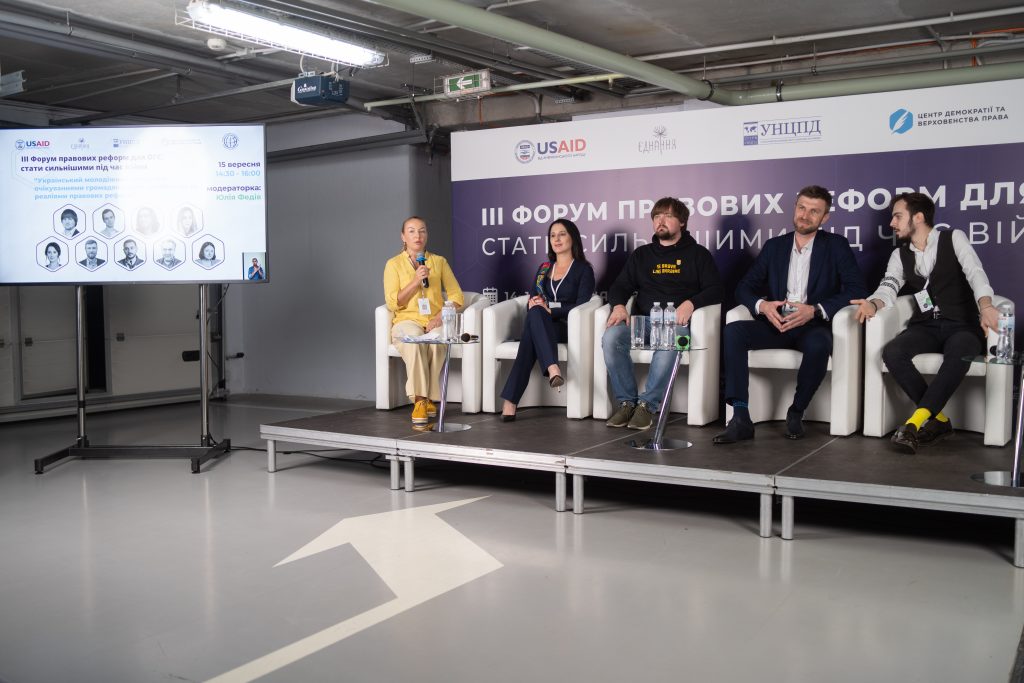
Also on September 15, two workshops for civil society organizations were held. At the first one, Olha Petriv, CEDEM lawyer, introduced participants to artificial intelligence tools. They talked about legal regulation and ways of its development, as well as about useful applications that will help the civic sector in its work.
Next, Ihor Koblikov, CEDEM lawyer, spoke about the importance of full access of CSOs to basic banking (payment) services and related financial monitoring measures (anti-money laundering, financing of terrorism and weapons of mass destruction), which cause a lot of complaints in the civic sector. As a result of the workshop, the participants learned about the peculiarities of the Ukrainian banking system, the requirements of Ukrainian and international legislation in the field of financial monitoring, as well as received recommendations and practical advice that will help to improve communication with banks and take the necessary measures to prevent problems with access to banking services in the future.
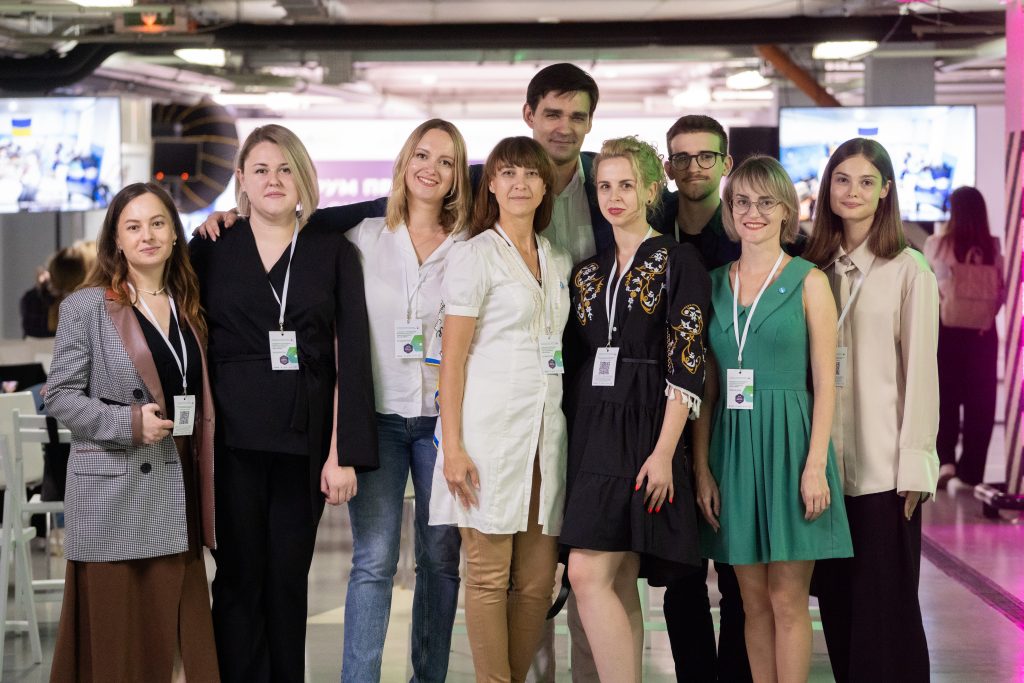
This forum was made possible with the sincere support of the American people through the United States Agency for International Development (USAID) within the Ukrainian Civil Society Sectoral Support Initiative project implemented by Initiative Center to Support Social Action “Ednannia” in partnership with the Ukrainian Center for Independent Political Research (UCIPR) and the Centre for Democracy and Rule of Law (CEDEM).
